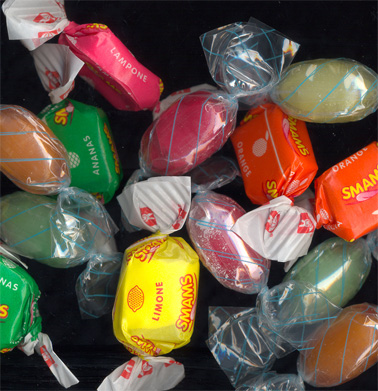Diet and Fluor
Diet
A healthy balanced diet is recommended, snacks between meals avoided, especially sweet and sticky food. The dental profession advises patients to choose food products with the label Sympadent (a tooth under an umbrella), especially for children.
The digestion starts in the oral cavity and the enzymes of the saliva produce a residue that sticks to the teeth called dental plaque. This plaque contains acid which attacks the dental enamel and bare root surfaces. It is therefore essential to eliminate the plaque within 30 minutes.
The fluorides are found in nature as salts of fluorine. They are also found in humans, in small quantities. If they are in direct contact with the teeth, the fluorides allow an effective prevention of cavities:
- They enhance the enamel resistance to acids
- They slow down the decalcification of the enamel by the bacteria contained in the plaque
- They favour the remineralisation of the superficial enamel
In Switzerland the quantity of fluorides present in the drinking water and food is very small, so it does not present a natural protection for the teeth. We recommend using dental hygiene products containing fluorides and fluoride kitchen salt.
The use of fluoride dental gels and toothpastes is essential to fight caries. They act directly on the tooth surface.
Instead of fluoride kitchen salt, fluoride pastilles can be used between 6 months and 12 years of age. Thus the fluoride is brought to the surface of the tooth buds through the bloodstream.
The surface of the tooth should also be exposed to fluoride by rinsing.
For this we recommend:
1. Daily use of toothpaste containing fluoride:
- After the eruption of the first deciduous tooth, a toothpaste for children containing fluoride (0.025% F¯)
- After the eruption of the first permanent molar (around 6 years of age) normal toothpaste containing fluoride (up to 0.15% F¯).
- It is very important to spit out the toothpaste without rinsing to prolong the effect of the fluorides.
2. Fluoride Gel once a week is recommended if the caries risk is high.
After 6 years of age, weekly brushing with fluoride gel (1.25% F¯) is recommended. Do not eat or drink for one hour after the application of gel (ideally in the evening just before going to bed).
A mouth rinse containing fluoride (0,02-0,03% F¯) can replace the gel, but the caries protection will be less efficient than the gel. Mouth rinse can never replace tooth brushing!
For patients with orthodontic appliances, it is recommended to rinse with a fluoride solution every day after tooth brushing.


